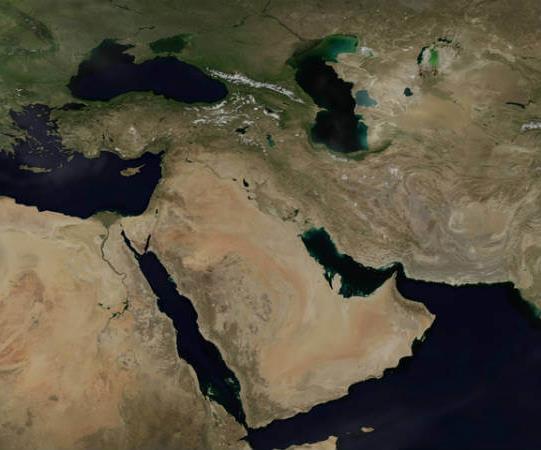 Article by Maria Al Makahleh Dubovikova and Shehab Al-Makahleh
Article by Maria Al Makahleh Dubovikova and Shehab Al-Makahleh
Russia is finding it difficult to gain a foothold in the Middle East.
At a time when tensions between Moscow and Washington are on the rise, Russia is determined to have a greater say in global affairs, particularly in the tumultuous Middle East. At present, Russia considers itself as a major serious, honest and active player in the region and blames the United States for the chaos unfolding in the Middle East. Russian President Vladimir Putin seeks to recreate the former Soviet Union in a new form on the world stage, particularly in the Middle East due to its proximity to Russia.
On the other hand, Washington is committed to Gulf states’ security as well as Israel’s stability and full protection from any aggression. Yet Russia has strong relationships with Middle Eastern and North African states that could function as a springboard for future influence. Indeed, Russia has become a magnet for Middle Eastern leaders who seek a new balance of power, as illustrated by the Jordanian and Saudi monarchs’ planned visits to Moscow in October.
The start of Russian intervention in the region dates back to the fall of the Libyan leader Muammar Gaddafi, with whom Moscow had historically enjoyed warm ties and mutual cooperation. The collapse of the Gaddafi regime happened as a result of non-involvement as Russia refrained from voting against the 2011 United Nations Security Council resolution against Gaddafi. This had been a wake-up call for Russia, driving it to re-engage in the region and to take a stronger stance on Syria.
Today, Russia bets on the end of the Syrian conflict before the year’s end. The Amman-based Military Operations Center (MOC) that was established by the US and its allies to monitor and train armed opposition groups, including the Free Syrian Army and the Tribes Army, has finally been shut down. With the return of the Syrian Army to the south of the country, near the crossing point with Jordan, there are mounting signs that the conflict is drawing to a close, especially given that America is no longer backing the opposition, which now finds itself in disarray.
As a result, Moscow is driven to focus more on Libya, where it plans to build a strong presence and establish a base from which to control North Africa. To emphasize Tripoli’s renewed importance, Moscow is giving due concern to the country and its affairs. Indeed, on August 13, the Libyan military commander Khalifa Haftar met with Russian Foreign Minister Sergei Lavrov and Defense Minister Sergei Shoigu in Moscow. Because Russia supports both Haftar and the Libyan Prime Minister Fayez al-Sarraj, who along with his government is recognized by the UN, the visit to Moscow appears aimed to broker a peace agreement to end the conflict in Libya, which has become a source of high risk to many countries in North Africa and Southern Europe.
This is the second time Russia received the two Libyan leaders in Moscow in 2017. Such meetings serve as a backdrop for Putin, who seeks to exert more pressure on the West to get more concessions regarding Ukraine and Syria.
Though Moscow wants to establish stable ties with many countries in the Middle East, it is difficult for Russia to find a strong foothold in the region, especially compared to that enjoyed by the US. This is because other players are trying to distract Russia by involving it in conflicts near its borders such as in Georgia and Ukraine. However, the Russian government has been planning, since the beginning of the Arab Spring, to build a presence in the Middle East at the expense of the Americans, the British and the French, benefitting from its impressive arms sales to the region in recent years.
Russia is not only affecting politics in Syria, Iraq and North Africa, but also those in the Arabian Peninsula, such as the crisis between Qatar and the other Gulf Cooperation Council members and the war in Yemen. Moscow tries to balance its policy toward Saudi Arabia, Kuwait, Qatar, the United Arab Emirates, Oman and Bahrain with non-interference. On the other hand, Moscow considers Tehran as a key player in the region and a main pillar of its stability. Russians view Iran as being influential in the Gulf, in the Caucasus and in Central Asia. Thus, this qualifies Russia to play the role of a mediator between Riyadh and Tehran to solve their regional dispute. In 2015, a meeting was held for Arab leaders in Morocco that set the stage for the UAE to align with Moscow, while Saudi Arabia would align with Washington.
In sum, Moscow has started to change the anti-Russian sentiment in the Middle East through its political, economic and media influence by partnerships, economic assistance, military assistance and strategic cooperation. Russia learned from previous lessons in Yemen, Iraq, Algeria and Afghanistan that, in order to be effective, it needs to be symbolically present without being extensively involved in these Middle Eastern affairs, as long as there are representatives or proxies that can help achieve the objectives with fewer harmful repercussions for Moscow.
Article published in Fair Observer: https://www.fairobserver.com/region/middle_east_north_africa/russia-role-middle-east-politics-syria-yemen-gulf-latest-news-16531/
Photo Credit: capitanoseye / Shutterstock.com











